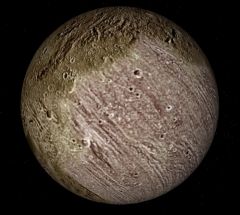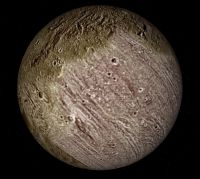Iocaste
Revision as of 11:38, 29 September 2024 by Arvil (talk | contribs) (Arvil moved page User:Arvil/Sandbox02 to Iocaste: Move to article page.)
Iocaste (Jupiter XVIV S/1999 J 3) is a retrograde irregular satellite of Jupiter. Discovered by Scott Sheppard and his team on 23 November 2000 at the Mauna Kea Observatory, it was named after Jocasta, wife and mother of Oedipus.
Iocaste in Orbiter
Iocaste was introduced to Orbiter by the add-on outerplanets-050125.zip in January 2005.
| Add-on | Source | Version | Author | Type | Release Date | Compatibility | Wiki article |
|---|---|---|---|---|---|---|---|
| The Outer Planets 050125 | AVSIM | 050125 | Rolf Keibel Tony Dunn |
Scenery | 26 January 2005 | Orbiter 2005-P1 | |
See also
Gallery
| edit The Solar System | |
|---|---|
| Central star |
Sun (Sol) |
| Planets |
Mercury - Venus - Earth - Mars - Jupiter - Saturn - Uranus - Neptune |
| Natural satellites |
Moon - Phobos - Deimos - Io - Europa - Ganymede - Titan - more... |
| Add-ons |
Planets - Dwarf Planets - Small objects - Natural satellites - Alternative star systems |
 | This natural satellite related article is a stub. You can help Orbiterwiki by expanding it.
|


